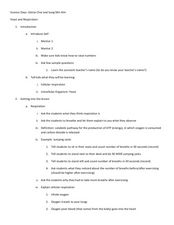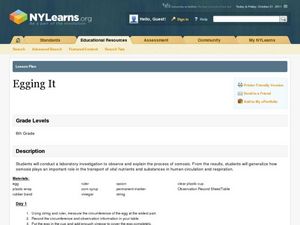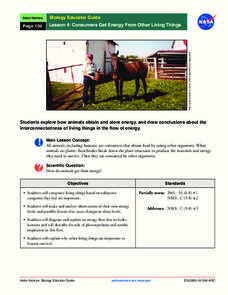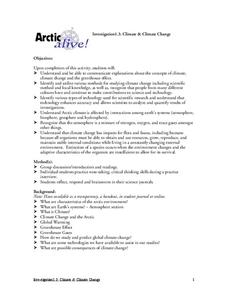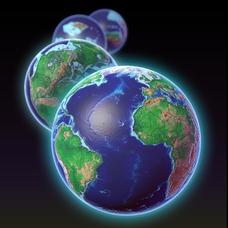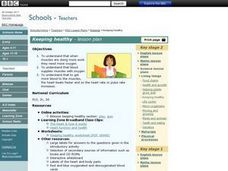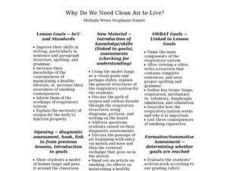Curated OER
Circulatory and Respiratory Systems Unit - Biology Teaching Thesis
Students Explain how an increased level of activity translates to cells needing more oxygen and how the lungs supply this oxygen by entering the blood stream. They also can explain that the heart is responsible for moving both oxygenated...
Chicago Botanic Garden
Greenhouse Gas Emissions — Natural and Human Causes
What impact do humans have on greenhouse gas emissions? What are the natural causes of these gasses? Thanks to the carbon cycle, carbon dioxide eats away at the earth's atmosphere with the intensified help of humans. Young scientists...
Curated OER
Yeast and Respiration
Learners explore oxygen properties by conducting a cell experiment in class. In this respiration instructional activity, students discuss the process of breathing and how oxygen is inhaled before carbon dioxide is exhaled. Learners...
Chicago Botanic Garden
Greenhouse Gas Emissions – Natural and Human Causes
Part three in the series of seven has pupils discussing the different greenhouses gases, learning about the carbon cycle, and then watching a short video about the carbon cycle. Based on their knowledge, individuals complete a greenhouse...
Montana State University
Climb into Action!
Climate change affects even the largest and intimidating of landforms—even Mount Everest! A resource helps teach learners the connection between global climate change and its effects on Earth. Activities include videos, class discussion,...
NASA
Producers Make Their Own Food
During an inquiry-based lesson, scholars decide which variable to test and then design an experiment to determine the needs of producers. After two weeks, they complete a full analysis and research paper.
Curated OER
How Can Clear of Tress Destroy a Community?
Fifth graders brainstorm the relationship between trees and humans to determine how humans benefit from trees and how they benefit from us. They discuss oxygen/carbon dioxide exchange, soil stablization, animal habitat, shade, medicine...
Curated OER
The Living Environment
Students explore the cycles of an ecosystem. In this environmental science lesson, students work in groups to research the nitrogen cycle, the water cycle, or the oxygen-carbon dioxide cycle. Students prepare a PowerPoint or other...
NOAA
Deep-Sea Ecosystems – Entering the Twilight Zone
Imagine an ecosystem without any light or oxygen, where living things convert carbon dioxide into food. This ecosystem is thriving and might just be the largest ecosystem on our planet, yet we know very little about it. The lesson...
Curated OER
Egging It
Sixth graders discover scientific processes by conducting an experiment in class. In this osmosis lesson, 6th graders utilize eggs, cooking ingredients, string and plastic cups to create an experiment in which they watch the exchange of...
NASA
Consumers Get Energy From Other Living Things
How do plants and animals get their food? Learn about where energy comes from, how animals store energy, and aerobic respiration, in a lesson that allows scholars to diagram energy flows.
Curated OER
Science: What Is the Carbon Cycle?
Students examine the carbon cycle while identifying its sources, sinks, and release agents. Using magazines and newspapers, groups of students design collages illustrating the carbon cycle. Finally, they write responses to several...
Curated OER
Environment: Climate Change
Students explore climate change and the greenhouse effect. Using provided definitions, they assess local weather conditions and analyze long term climatic data for their areas. Once they explore the concept of and connection between...
Howard Hughes Medical Institute
EarthViewer
Can you imagine Washington DC and London as close neighbors occupying the same continent? Learners will be fascinated as they step back in time and discover the evolution of the earth's continents and oceans from 4.5 billion...
Curated OER
How do plant & animal cells make and use energy?
Students show the relationship between the need for plants to undergo photosynthesis in order to generate oxygen. They see the flaws associated with this thinking because of the lack of CO2 and H2O and lack of sufficient gravity in order...
NOAA
The Biogeochemical Cycle
The biogeochemical cycle ... no physics? The fourth installment of a 23-part NOAA Enrichment in Marine sciences and Oceanography (NEMO) program introduces the biogeochemical cycle by having pupils simulate movement between Earth's...
Curated OER
Teaching about the Chemistry of Oxygen Solubility
Pupils explore solubility of gases in water, Henry's Law, LeChatelier's Principal, and supersaturation of gases in water.
Curated OER
Keeping Healthy Lesson Plan
Students explore how muscles work. In this health lesson, students identify how the blood supplies muscles with oxygen. Students participate in an online activity to reinforce the concepts.
Curated OER
Ice Core Clues
Students create a PowerPoint presentation on the information they research about the ice cores and what they tell us about Earth's past. In this ice core lesson plan, students research radioactivity, air pollution, sodium, snowfall...
Curated OER
Why Do We Need Clean Air to Live? - Biology Teaching Thesis
Students name the main components of the respiratory system. They write a reaction that contains complete sentences, and uses proper spelling and grammar, after viewing a video. Students define the following terms: lungs, respiration,...
Curated OER
How Does Your Garden Grow?
Young gardners read and listen to books about seeds, plants, and the growing process. They plant seeds in plastic cups to observe the process of root-growing and plant formation. The whole class walks through a field to collect seeds...
Serendip
How Do Muscles Get the Energy They Need for Athletic Activity?
Every muscle movement requires energy, but where does that energy come from? Scholars answer this question and more as they complete a worksheet. By following the directions, completing research, and discussing it as a class, they begin...
Curated OER
TE Activity: Bubbling Plants
Students study a way to quantify the process of photosynthesis during a given time using the Elodea plant. They design a hypothesis that they test in the hands on activity. They compare the amounts of photosynthesis that occur during low...
Kenan
Respiratory System
Explore the respiratory system with a model. First, pupils build a set of lungs to experiment how they inflate and deflate. Then, they delve deeper into the topic with a web quest to discover new information about the nose, trachea, and...
Other popular searches
- Carbon Dioxide Oxygen Cycle
- Oxygen, Carbon Dioxide Cycle
- Carbon Dioxide/ Oxygen Cycle
- Oxygen Carbon Dioxide Cycle
- Oxygen Carbon Dioxide Cycle
- Oxygen Carbon Dioxide Cycle
- Air Oxygen Carbon Dioxide
- Carbon Dioxide Oxygen Cycle


